Business Environment Analysis: Iceland Supermarket Report
VerifiedAdded on 2020/01/15
|14
|5799
|373
Report
AI Summary
This report provides a comprehensive analysis of the business environment, using Iceland Supermarket as a case study. It begins by identifying various organizational types and purposes, focusing on stakeholders like customers, employees, and shareholders, and how Iceland meets their objectives. The report then explores the nature of the national business environment, examining economic systems, fiscal and monetary policies, and competition policy's impact. It delves into market structure, pricing, and output decisions, as well as how market forces shape organizational responses. Finally, the report assesses the significance of global factors, including international trade and the impact of the European Union policies on Iceland Supermarket. The report covers topics such as stakeholder management, economic systems, market structure, and global factors affecting the business.
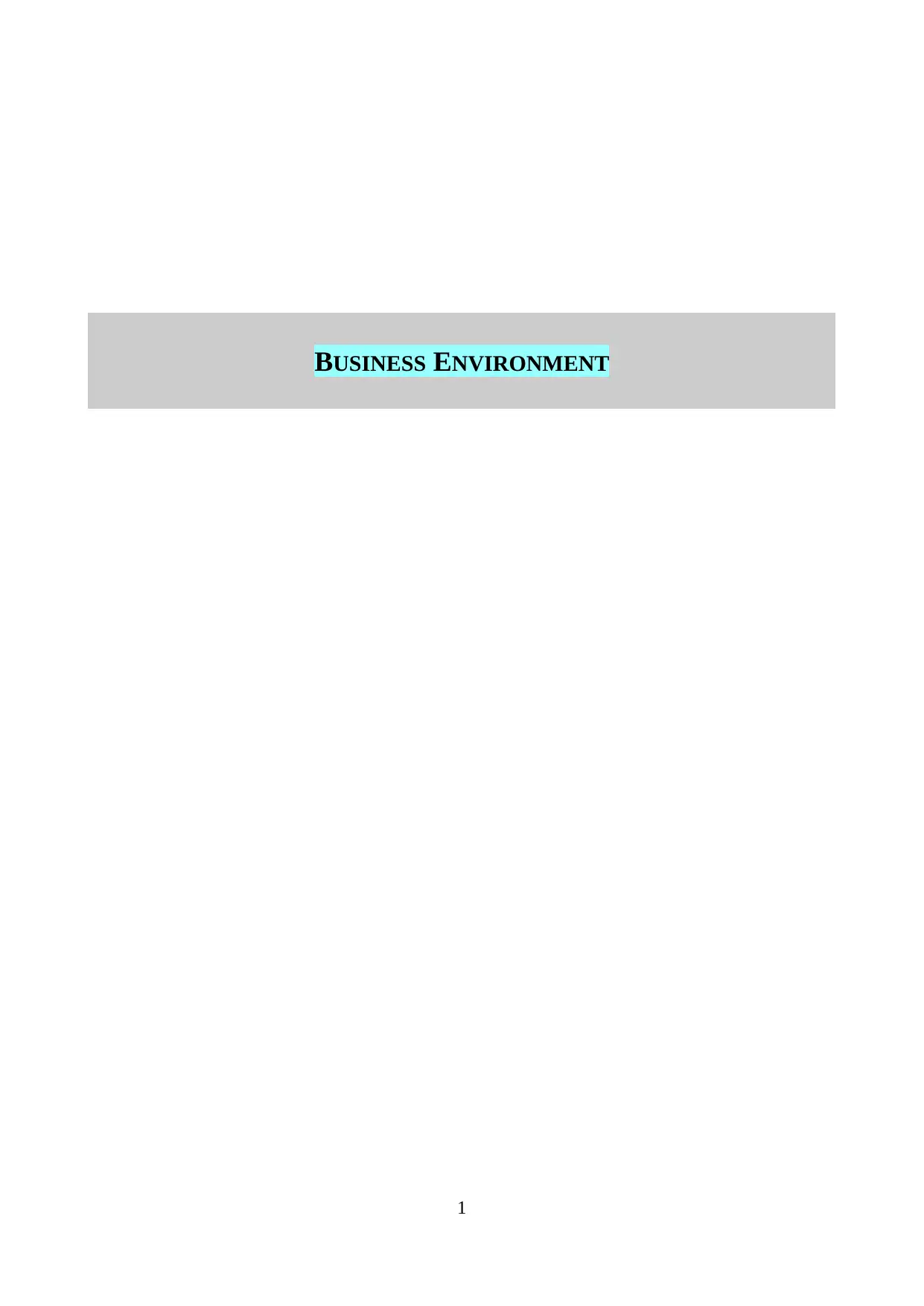
BUSINESS ENVIRONMENT
1
1
Paraphrase This Document
Need a fresh take? Get an instant paraphrase of this document with our AI Paraphraser
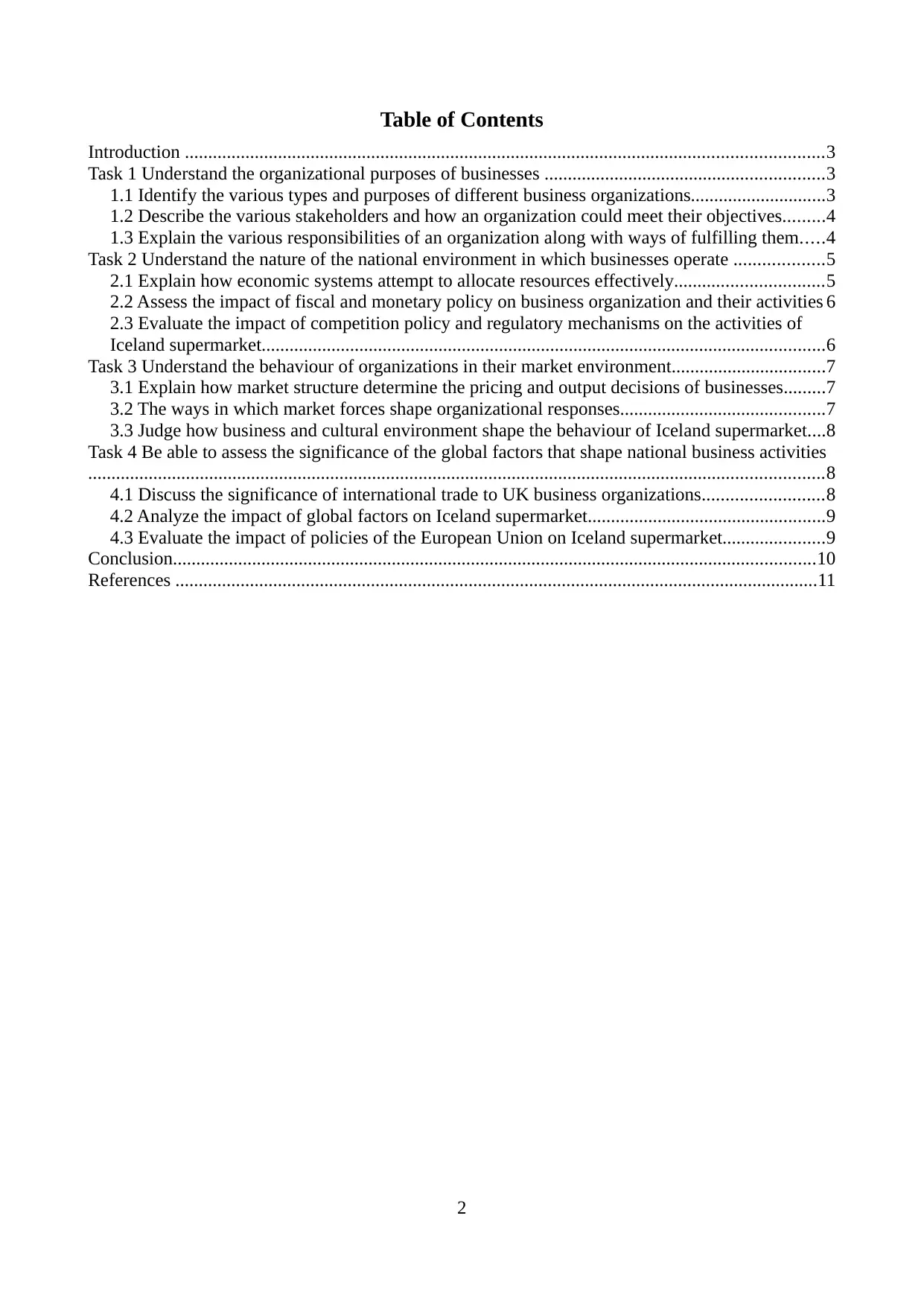
Table of Contents
Introduction .........................................................................................................................................3
Task 1 Understand the organizational purposes of businesses ............................................................3
1.1 Identify the various types and purposes of different business organizations.............................3
1.2 Describe the various stakeholders and how an organization could meet their objectives.........4
1.3 Explain the various responsibilities of an organization along with ways of fulfilling them.....4
Task 2 Understand the nature of the national environment in which businesses operate ...................5
2.1 Explain how economic systems attempt to allocate resources effectively................................5
2.2 Assess the impact of fiscal and monetary policy on business organization and their activities 6
2.3 Evaluate the impact of competition policy and regulatory mechanisms on the activities of
Iceland supermarket.........................................................................................................................6
Task 3 Understand the behaviour of organizations in their market environment.................................7
3.1 Explain how market structure determine the pricing and output decisions of businesses.........7
3.2 The ways in which market forces shape organizational responses............................................7
3.3 Judge how business and cultural environment shape the behaviour of Iceland supermarket....8
Task 4 Be able to assess the significance of the global factors that shape national business activities
..............................................................................................................................................................8
4.1 Discuss the significance of international trade to UK business organizations..........................8
4.2 Analyze the impact of global factors on Iceland supermarket...................................................9
4.3 Evaluate the impact of policies of the European Union on Iceland supermarket......................9
Conclusion..........................................................................................................................................10
References ..........................................................................................................................................11
2
Introduction .........................................................................................................................................3
Task 1 Understand the organizational purposes of businesses ............................................................3
1.1 Identify the various types and purposes of different business organizations.............................3
1.2 Describe the various stakeholders and how an organization could meet their objectives.........4
1.3 Explain the various responsibilities of an organization along with ways of fulfilling them.....4
Task 2 Understand the nature of the national environment in which businesses operate ...................5
2.1 Explain how economic systems attempt to allocate resources effectively................................5
2.2 Assess the impact of fiscal and monetary policy on business organization and their activities 6
2.3 Evaluate the impact of competition policy and regulatory mechanisms on the activities of
Iceland supermarket.........................................................................................................................6
Task 3 Understand the behaviour of organizations in their market environment.................................7
3.1 Explain how market structure determine the pricing and output decisions of businesses.........7
3.2 The ways in which market forces shape organizational responses............................................7
3.3 Judge how business and cultural environment shape the behaviour of Iceland supermarket....8
Task 4 Be able to assess the significance of the global factors that shape national business activities
..............................................................................................................................................................8
4.1 Discuss the significance of international trade to UK business organizations..........................8
4.2 Analyze the impact of global factors on Iceland supermarket...................................................9
4.3 Evaluate the impact of policies of the European Union on Iceland supermarket......................9
Conclusion..........................................................................................................................................10
References ..........................................................................................................................................11
2
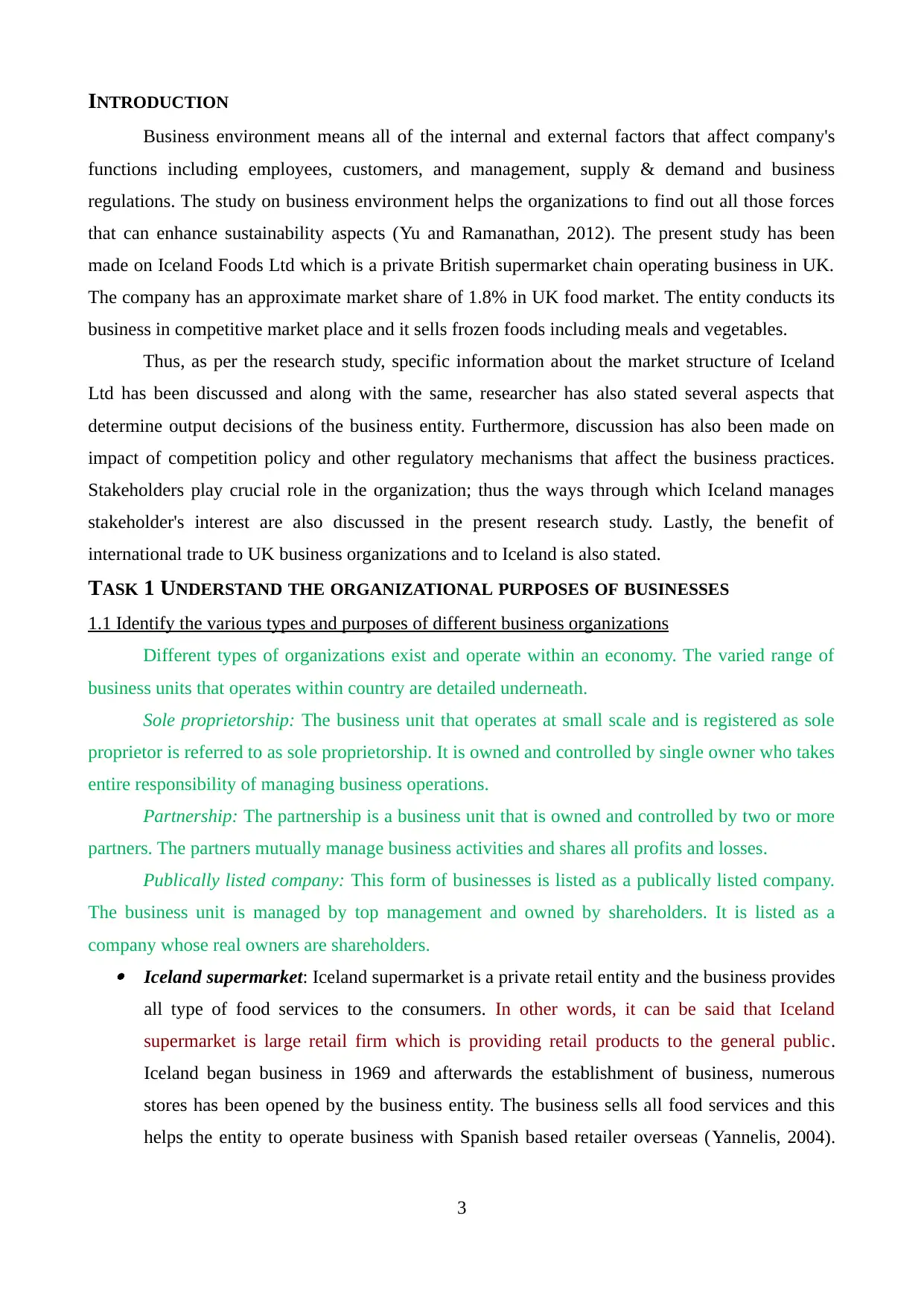
INTRODUCTION
Business environment means all of the internal and external factors that affect company's
functions including employees, customers, and management, supply & demand and business
regulations. The study on business environment helps the organizations to find out all those forces
that can enhance sustainability aspects (Yu and Ramanathan, 2012). The present study has been
made on Iceland Foods Ltd which is a private British supermarket chain operating business in UK.
The company has an approximate market share of 1.8% in UK food market. The entity conducts its
business in competitive market place and it sells frozen foods including meals and vegetables.
Thus, as per the research study, specific information about the market structure of Iceland
Ltd has been discussed and along with the same, researcher has also stated several aspects that
determine output decisions of the business entity. Furthermore, discussion has also been made on
impact of competition policy and other regulatory mechanisms that affect the business practices.
Stakeholders play crucial role in the organization; thus the ways through which Iceland manages
stakeholder's interest are also discussed in the present research study. Lastly, the benefit of
international trade to UK business organizations and to Iceland is also stated.
TASK 1 UNDERSTAND THE ORGANIZATIONAL PURPOSES OF BUSINESSES
1.1 Identify the various types and purposes of different business organizations
Different types of organizations exist and operate within an economy. The varied range of
business units that operates within country are detailed underneath.
Sole proprietorship: The business unit that operates at small scale and is registered as sole
proprietor is referred to as sole proprietorship. It is owned and controlled by single owner who takes
entire responsibility of managing business operations.
Partnership: The partnership is a business unit that is owned and controlled by two or more
partners. The partners mutually manage business activities and shares all profits and losses.
Publically listed company: This form of businesses is listed as a publically listed company.
The business unit is managed by top management and owned by shareholders. It is listed as a
company whose real owners are shareholders. Iceland supermarket: Iceland supermarket is a private retail entity and the business provides
all type of food services to the consumers. In other words, it can be said that Iceland
supermarket is large retail firm which is providing retail products to the general public.
Iceland began business in 1969 and afterwards the establishment of business, numerous
stores has been opened by the business entity. The business sells all food services and this
helps the entity to operate business with Spanish based retailer overseas (Yannelis, 2004).
3
Business environment means all of the internal and external factors that affect company's
functions including employees, customers, and management, supply & demand and business
regulations. The study on business environment helps the organizations to find out all those forces
that can enhance sustainability aspects (Yu and Ramanathan, 2012). The present study has been
made on Iceland Foods Ltd which is a private British supermarket chain operating business in UK.
The company has an approximate market share of 1.8% in UK food market. The entity conducts its
business in competitive market place and it sells frozen foods including meals and vegetables.
Thus, as per the research study, specific information about the market structure of Iceland
Ltd has been discussed and along with the same, researcher has also stated several aspects that
determine output decisions of the business entity. Furthermore, discussion has also been made on
impact of competition policy and other regulatory mechanisms that affect the business practices.
Stakeholders play crucial role in the organization; thus the ways through which Iceland manages
stakeholder's interest are also discussed in the present research study. Lastly, the benefit of
international trade to UK business organizations and to Iceland is also stated.
TASK 1 UNDERSTAND THE ORGANIZATIONAL PURPOSES OF BUSINESSES
1.1 Identify the various types and purposes of different business organizations
Different types of organizations exist and operate within an economy. The varied range of
business units that operates within country are detailed underneath.
Sole proprietorship: The business unit that operates at small scale and is registered as sole
proprietor is referred to as sole proprietorship. It is owned and controlled by single owner who takes
entire responsibility of managing business operations.
Partnership: The partnership is a business unit that is owned and controlled by two or more
partners. The partners mutually manage business activities and shares all profits and losses.
Publically listed company: This form of businesses is listed as a publically listed company.
The business unit is managed by top management and owned by shareholders. It is listed as a
company whose real owners are shareholders. Iceland supermarket: Iceland supermarket is a private retail entity and the business provides
all type of food services to the consumers. In other words, it can be said that Iceland
supermarket is large retail firm which is providing retail products to the general public.
Iceland began business in 1969 and afterwards the establishment of business, numerous
stores has been opened by the business entity. The business sells all food services and this
helps the entity to operate business with Spanish based retailer overseas (Yannelis, 2004).
3
⊘ This is a preview!⊘
Do you want full access?
Subscribe today to unlock all pages.

Trusted by 1+ million students worldwide
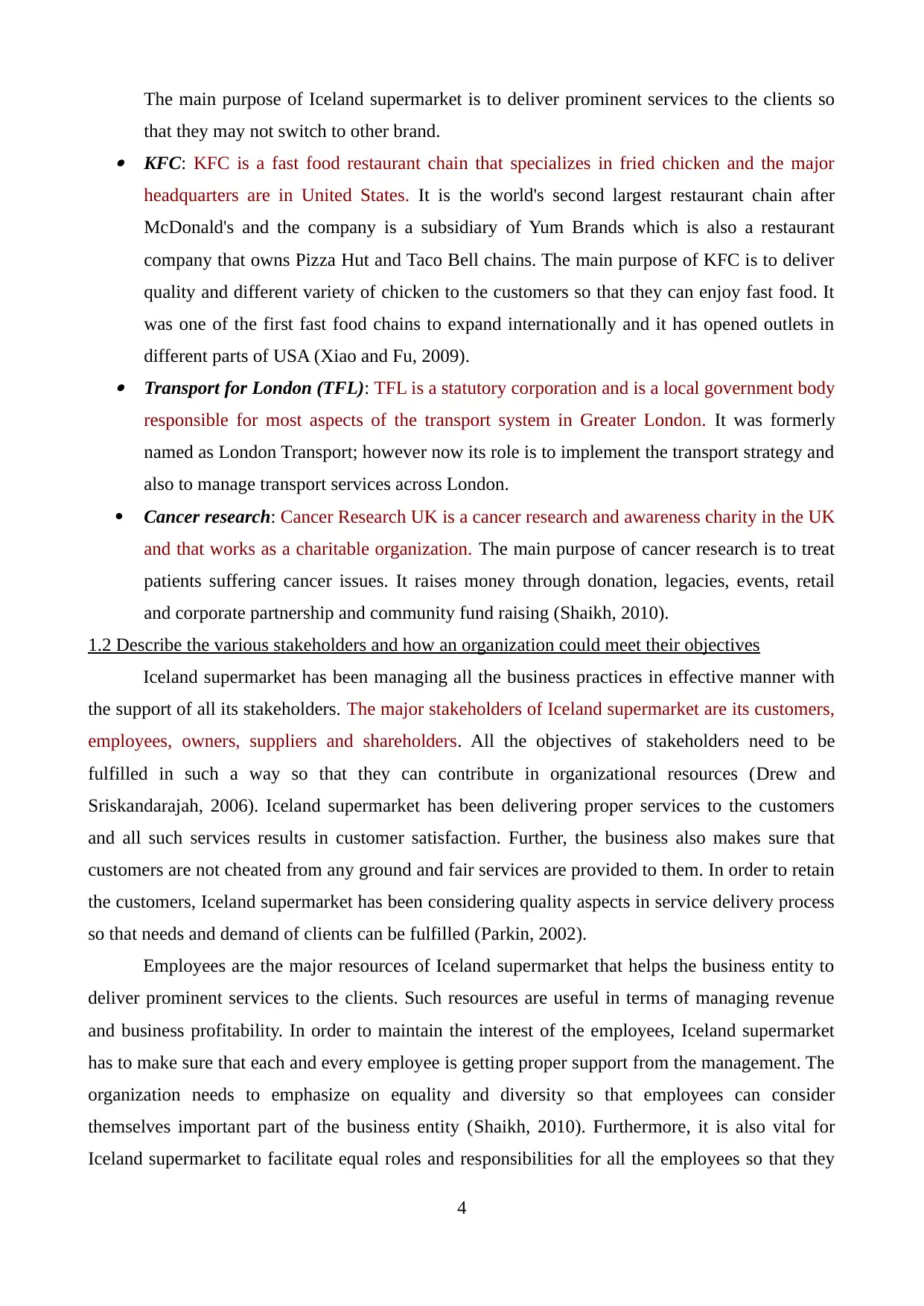
The main purpose of Iceland supermarket is to deliver prominent services to the clients so
that they may not switch to other brand. KFC: KFC is a fast food restaurant chain that specializes in fried chicken and the major
headquarters are in United States. It is the world's second largest restaurant chain after
McDonald's and the company is a subsidiary of Yum Brands which is also a restaurant
company that owns Pizza Hut and Taco Bell chains. The main purpose of KFC is to deliver
quality and different variety of chicken to the customers so that they can enjoy fast food. It
was one of the first fast food chains to expand internationally and it has opened outlets in
different parts of USA (Xiao and Fu, 2009). Transport for London (TFL): TFL is a statutory corporation and is a local government body
responsible for most aspects of the transport system in Greater London. It was formerly
named as London Transport; however now its role is to implement the transport strategy and
also to manage transport services across London.
Cancer research: Cancer Research UK is a cancer research and awareness charity in the UK
and that works as a charitable organization. The main purpose of cancer research is to treat
patients suffering cancer issues. It raises money through donation, legacies, events, retail
and corporate partnership and community fund raising (Shaikh, 2010).
1.2 Describe the various stakeholders and how an organization could meet their objectives
Iceland supermarket has been managing all the business practices in effective manner with
the support of all its stakeholders. The major stakeholders of Iceland supermarket are its customers,
employees, owners, suppliers and shareholders. All the objectives of stakeholders need to be
fulfilled in such a way so that they can contribute in organizational resources (Drew and
Sriskandarajah, 2006). Iceland supermarket has been delivering proper services to the customers
and all such services results in customer satisfaction. Further, the business also makes sure that
customers are not cheated from any ground and fair services are provided to them. In order to retain
the customers, Iceland supermarket has been considering quality aspects in service delivery process
so that needs and demand of clients can be fulfilled (Parkin, 2002).
Employees are the major resources of Iceland supermarket that helps the business entity to
deliver prominent services to the clients. Such resources are useful in terms of managing revenue
and business profitability. In order to maintain the interest of the employees, Iceland supermarket
has to make sure that each and every employee is getting proper support from the management. The
organization needs to emphasize on equality and diversity so that employees can consider
themselves important part of the business entity (Shaikh, 2010). Furthermore, it is also vital for
Iceland supermarket to facilitate equal roles and responsibilities for all the employees so that they
4
that they may not switch to other brand. KFC: KFC is a fast food restaurant chain that specializes in fried chicken and the major
headquarters are in United States. It is the world's second largest restaurant chain after
McDonald's and the company is a subsidiary of Yum Brands which is also a restaurant
company that owns Pizza Hut and Taco Bell chains. The main purpose of KFC is to deliver
quality and different variety of chicken to the customers so that they can enjoy fast food. It
was one of the first fast food chains to expand internationally and it has opened outlets in
different parts of USA (Xiao and Fu, 2009). Transport for London (TFL): TFL is a statutory corporation and is a local government body
responsible for most aspects of the transport system in Greater London. It was formerly
named as London Transport; however now its role is to implement the transport strategy and
also to manage transport services across London.
Cancer research: Cancer Research UK is a cancer research and awareness charity in the UK
and that works as a charitable organization. The main purpose of cancer research is to treat
patients suffering cancer issues. It raises money through donation, legacies, events, retail
and corporate partnership and community fund raising (Shaikh, 2010).
1.2 Describe the various stakeholders and how an organization could meet their objectives
Iceland supermarket has been managing all the business practices in effective manner with
the support of all its stakeholders. The major stakeholders of Iceland supermarket are its customers,
employees, owners, suppliers and shareholders. All the objectives of stakeholders need to be
fulfilled in such a way so that they can contribute in organizational resources (Drew and
Sriskandarajah, 2006). Iceland supermarket has been delivering proper services to the customers
and all such services results in customer satisfaction. Further, the business also makes sure that
customers are not cheated from any ground and fair services are provided to them. In order to retain
the customers, Iceland supermarket has been considering quality aspects in service delivery process
so that needs and demand of clients can be fulfilled (Parkin, 2002).
Employees are the major resources of Iceland supermarket that helps the business entity to
deliver prominent services to the clients. Such resources are useful in terms of managing revenue
and business profitability. In order to maintain the interest of the employees, Iceland supermarket
has to make sure that each and every employee is getting proper support from the management. The
organization needs to emphasize on equality and diversity so that employees can consider
themselves important part of the business entity (Shaikh, 2010). Furthermore, it is also vital for
Iceland supermarket to facilitate equal roles and responsibilities for all the employees so that they
4
Paraphrase This Document
Need a fresh take? Get an instant paraphrase of this document with our AI Paraphraser
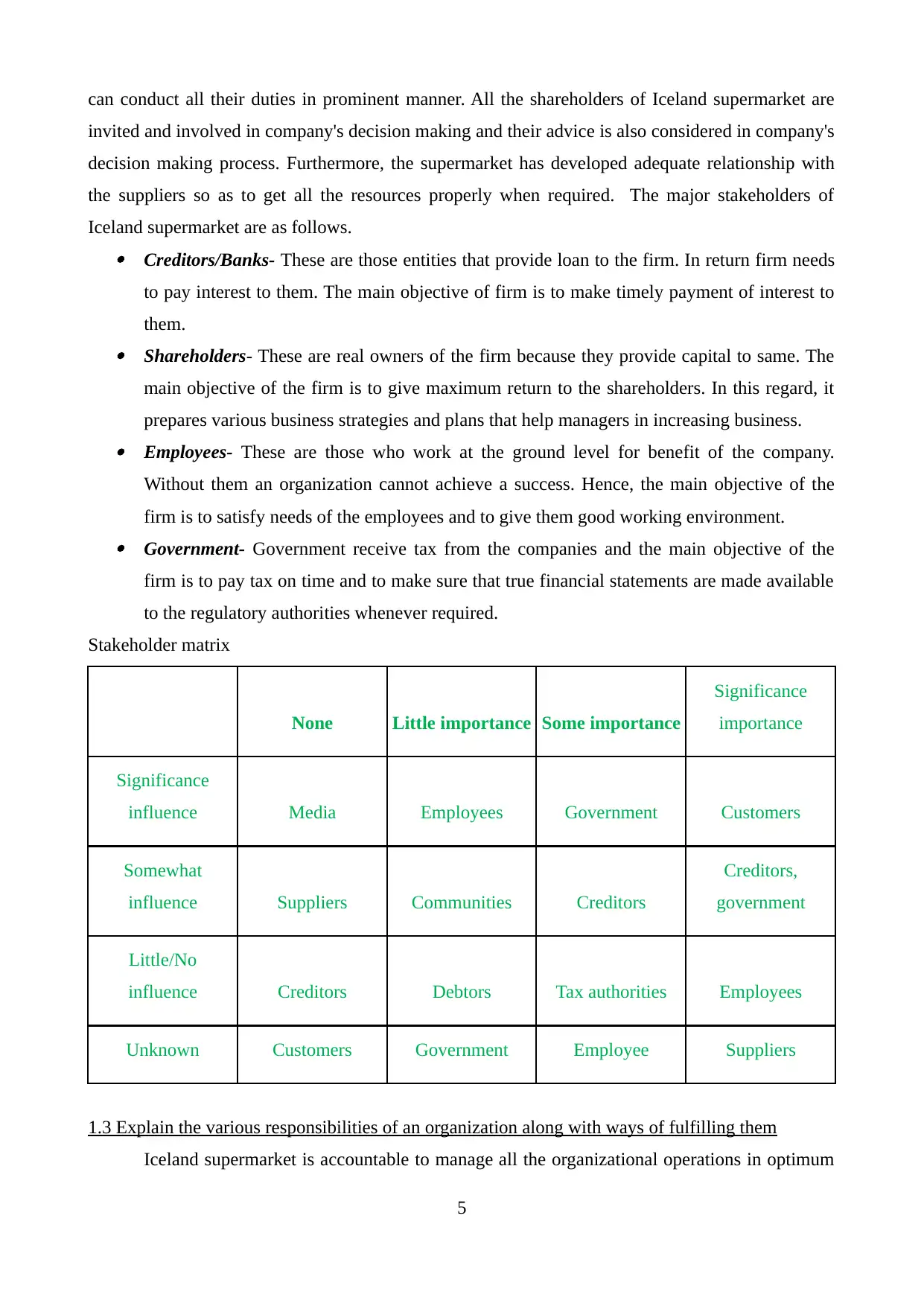
can conduct all their duties in prominent manner. All the shareholders of Iceland supermarket are
invited and involved in company's decision making and their advice is also considered in company's
decision making process. Furthermore, the supermarket has developed adequate relationship with
the suppliers so as to get all the resources properly when required. The major stakeholders of
Iceland supermarket are as follows. Creditors/Banks- These are those entities that provide loan to the firm. In return firm needs
to pay interest to them. The main objective of firm is to make timely payment of interest to
them. Shareholders- These are real owners of the firm because they provide capital to same. The
main objective of the firm is to give maximum return to the shareholders. In this regard, it
prepares various business strategies and plans that help managers in increasing business. Employees- These are those who work at the ground level for benefit of the company.
Without them an organization cannot achieve a success. Hence, the main objective of the
firm is to satisfy needs of the employees and to give them good working environment. Government- Government receive tax from the companies and the main objective of the
firm is to pay tax on time and to make sure that true financial statements are made available
to the regulatory authorities whenever required.
Stakeholder matrix
None Little importance Some importance
Significance
importance
Significance
influence Media Employees Government Customers
Somewhat
influence Suppliers Communities Creditors
Creditors,
government
Little/No
influence Creditors Debtors Tax authorities Employees
Unknown Customers Government Employee Suppliers
1.3 Explain the various responsibilities of an organization along with ways of fulfilling them
Iceland supermarket is accountable to manage all the organizational operations in optimum
5
invited and involved in company's decision making and their advice is also considered in company's
decision making process. Furthermore, the supermarket has developed adequate relationship with
the suppliers so as to get all the resources properly when required. The major stakeholders of
Iceland supermarket are as follows. Creditors/Banks- These are those entities that provide loan to the firm. In return firm needs
to pay interest to them. The main objective of firm is to make timely payment of interest to
them. Shareholders- These are real owners of the firm because they provide capital to same. The
main objective of the firm is to give maximum return to the shareholders. In this regard, it
prepares various business strategies and plans that help managers in increasing business. Employees- These are those who work at the ground level for benefit of the company.
Without them an organization cannot achieve a success. Hence, the main objective of the
firm is to satisfy needs of the employees and to give them good working environment. Government- Government receive tax from the companies and the main objective of the
firm is to pay tax on time and to make sure that true financial statements are made available
to the regulatory authorities whenever required.
Stakeholder matrix
None Little importance Some importance
Significance
importance
Significance
influence Media Employees Government Customers
Somewhat
influence Suppliers Communities Creditors
Creditors,
government
Little/No
influence Creditors Debtors Tax authorities Employees
Unknown Customers Government Employee Suppliers
1.3 Explain the various responsibilities of an organization along with ways of fulfilling them
Iceland supermarket is accountable to manage all the organizational operations in optimum
5
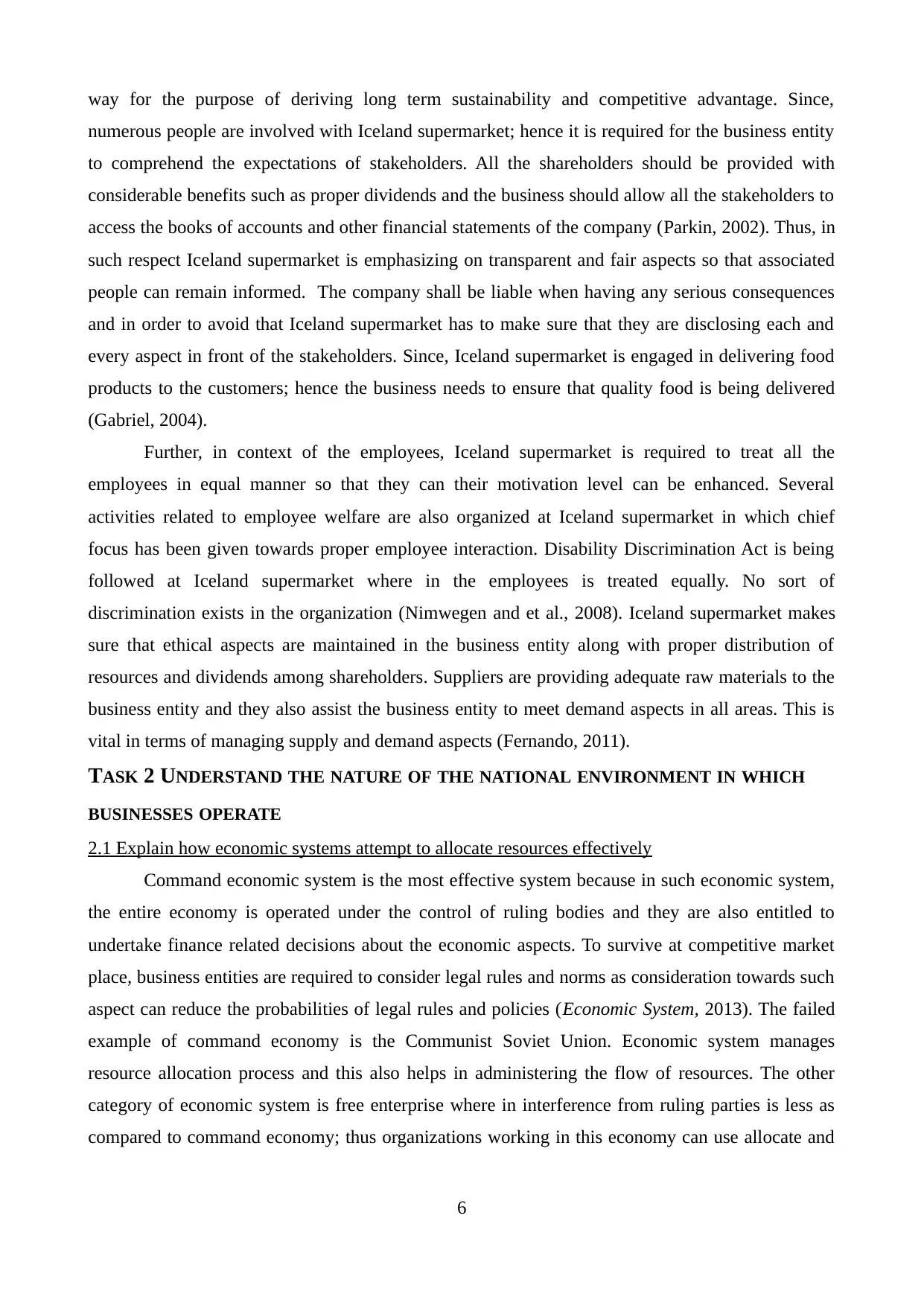
way for the purpose of deriving long term sustainability and competitive advantage. Since,
numerous people are involved with Iceland supermarket; hence it is required for the business entity
to comprehend the expectations of stakeholders. All the shareholders should be provided with
considerable benefits such as proper dividends and the business should allow all the stakeholders to
access the books of accounts and other financial statements of the company (Parkin, 2002). Thus, in
such respect Iceland supermarket is emphasizing on transparent and fair aspects so that associated
people can remain informed. The company shall be liable when having any serious consequences
and in order to avoid that Iceland supermarket has to make sure that they are disclosing each and
every aspect in front of the stakeholders. Since, Iceland supermarket is engaged in delivering food
products to the customers; hence the business needs to ensure that quality food is being delivered
(Gabriel, 2004).
Further, in context of the employees, Iceland supermarket is required to treat all the
employees in equal manner so that they can their motivation level can be enhanced. Several
activities related to employee welfare are also organized at Iceland supermarket in which chief
focus has been given towards proper employee interaction. Disability Discrimination Act is being
followed at Iceland supermarket where in the employees is treated equally. No sort of
discrimination exists in the organization (Nimwegen and et al., 2008). Iceland supermarket makes
sure that ethical aspects are maintained in the business entity along with proper distribution of
resources and dividends among shareholders. Suppliers are providing adequate raw materials to the
business entity and they also assist the business entity to meet demand aspects in all areas. This is
vital in terms of managing supply and demand aspects (Fernando, 2011).
TASK 2 UNDERSTAND THE NATURE OF THE NATIONAL ENVIRONMENT IN WHICH
BUSINESSES OPERATE
2.1 Explain how economic systems attempt to allocate resources effectively
Command economic system is the most effective system because in such economic system,
the entire economy is operated under the control of ruling bodies and they are also entitled to
undertake finance related decisions about the economic aspects. To survive at competitive market
place, business entities are required to consider legal rules and norms as consideration towards such
aspect can reduce the probabilities of legal rules and policies (Economic System, 2013). The failed
example of command economy is the Communist Soviet Union. Economic system manages
resource allocation process and this also helps in administering the flow of resources. The other
category of economic system is free enterprise where in interference from ruling parties is less as
compared to command economy; thus organizations working in this economy can use allocate and
6
numerous people are involved with Iceland supermarket; hence it is required for the business entity
to comprehend the expectations of stakeholders. All the shareholders should be provided with
considerable benefits such as proper dividends and the business should allow all the stakeholders to
access the books of accounts and other financial statements of the company (Parkin, 2002). Thus, in
such respect Iceland supermarket is emphasizing on transparent and fair aspects so that associated
people can remain informed. The company shall be liable when having any serious consequences
and in order to avoid that Iceland supermarket has to make sure that they are disclosing each and
every aspect in front of the stakeholders. Since, Iceland supermarket is engaged in delivering food
products to the customers; hence the business needs to ensure that quality food is being delivered
(Gabriel, 2004).
Further, in context of the employees, Iceland supermarket is required to treat all the
employees in equal manner so that they can their motivation level can be enhanced. Several
activities related to employee welfare are also organized at Iceland supermarket in which chief
focus has been given towards proper employee interaction. Disability Discrimination Act is being
followed at Iceland supermarket where in the employees is treated equally. No sort of
discrimination exists in the organization (Nimwegen and et al., 2008). Iceland supermarket makes
sure that ethical aspects are maintained in the business entity along with proper distribution of
resources and dividends among shareholders. Suppliers are providing adequate raw materials to the
business entity and they also assist the business entity to meet demand aspects in all areas. This is
vital in terms of managing supply and demand aspects (Fernando, 2011).
TASK 2 UNDERSTAND THE NATURE OF THE NATIONAL ENVIRONMENT IN WHICH
BUSINESSES OPERATE
2.1 Explain how economic systems attempt to allocate resources effectively
Command economic system is the most effective system because in such economic system,
the entire economy is operated under the control of ruling bodies and they are also entitled to
undertake finance related decisions about the economic aspects. To survive at competitive market
place, business entities are required to consider legal rules and norms as consideration towards such
aspect can reduce the probabilities of legal rules and policies (Economic System, 2013). The failed
example of command economy is the Communist Soviet Union. Economic system manages
resource allocation process and this also helps in administering the flow of resources. The other
category of economic system is free enterprise where in interference from ruling parties is less as
compared to command economy; thus organizations working in this economy can use allocate and
6
⊘ This is a preview!⊘
Do you want full access?
Subscribe today to unlock all pages.

Trusted by 1+ million students worldwide
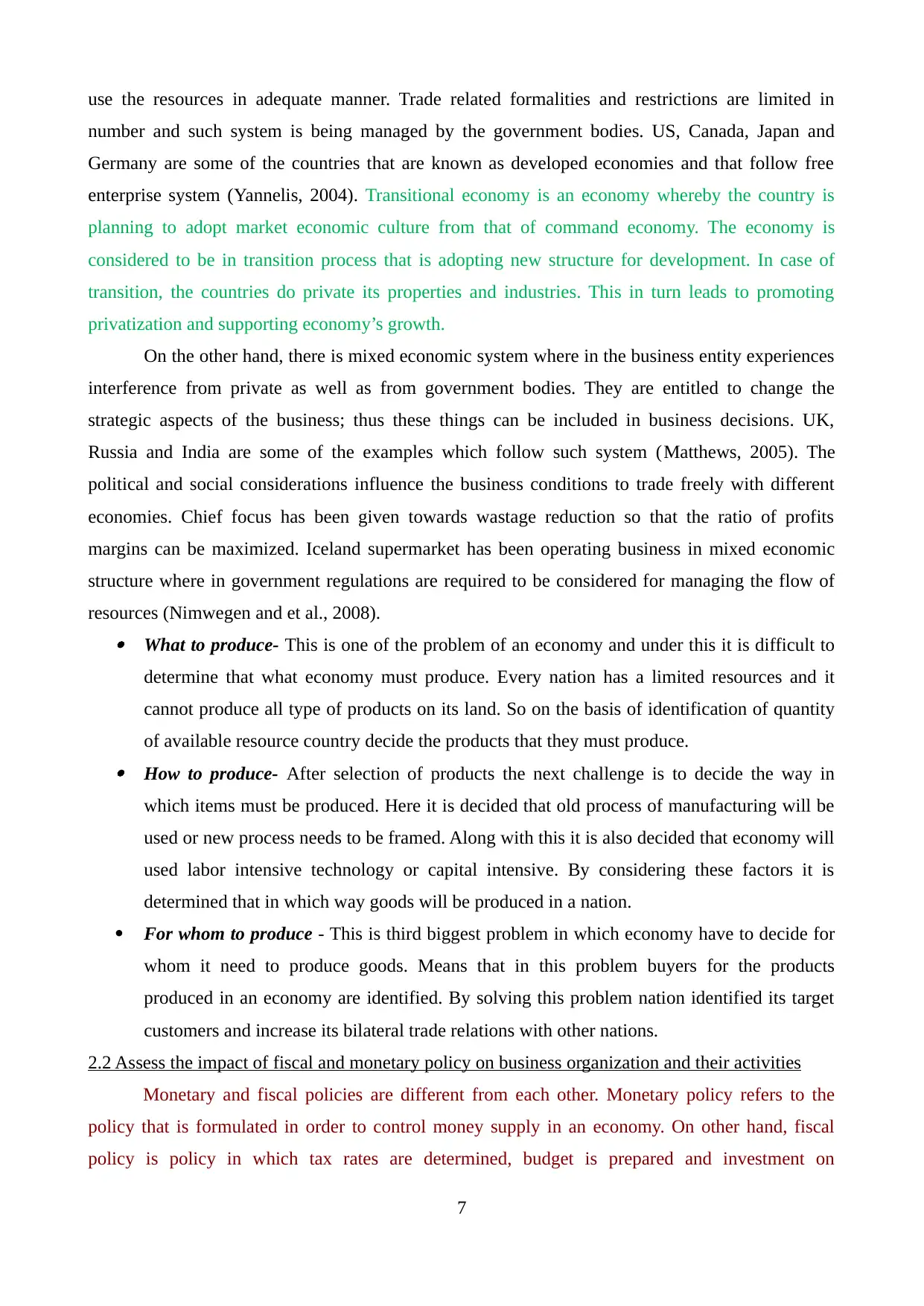
use the resources in adequate manner. Trade related formalities and restrictions are limited in
number and such system is being managed by the government bodies. US, Canada, Japan and
Germany are some of the countries that are known as developed economies and that follow free
enterprise system (Yannelis, 2004). Transitional economy is an economy whereby the country is
planning to adopt market economic culture from that of command economy. The economy is
considered to be in transition process that is adopting new structure for development. In case of
transition, the countries do private its properties and industries. This in turn leads to promoting
privatization and supporting economy’s growth.
On the other hand, there is mixed economic system where in the business entity experiences
interference from private as well as from government bodies. They are entitled to change the
strategic aspects of the business; thus these things can be included in business decisions. UK,
Russia and India are some of the examples which follow such system (Matthews, 2005). The
political and social considerations influence the business conditions to trade freely with different
economies. Chief focus has been given towards wastage reduction so that the ratio of profits
margins can be maximized. Iceland supermarket has been operating business in mixed economic
structure where in government regulations are required to be considered for managing the flow of
resources (Nimwegen and et al., 2008). What to produce- This is one of the problem of an economy and under this it is difficult to
determine that what economy must produce. Every nation has a limited resources and it
cannot produce all type of products on its land. So on the basis of identification of quantity
of available resource country decide the products that they must produce. How to produce- After selection of products the next challenge is to decide the way in
which items must be produced. Here it is decided that old process of manufacturing will be
used or new process needs to be framed. Along with this it is also decided that economy will
used labor intensive technology or capital intensive. By considering these factors it is
determined that in which way goods will be produced in a nation.
For whom to produce - This is third biggest problem in which economy have to decide for
whom it need to produce goods. Means that in this problem buyers for the products
produced in an economy are identified. By solving this problem nation identified its target
customers and increase its bilateral trade relations with other nations.
2.2 Assess the impact of fiscal and monetary policy on business organization and their activities
Monetary and fiscal policies are different from each other. Monetary policy refers to the
policy that is formulated in order to control money supply in an economy. On other hand, fiscal
policy is policy in which tax rates are determined, budget is prepared and investment on
7
number and such system is being managed by the government bodies. US, Canada, Japan and
Germany are some of the countries that are known as developed economies and that follow free
enterprise system (Yannelis, 2004). Transitional economy is an economy whereby the country is
planning to adopt market economic culture from that of command economy. The economy is
considered to be in transition process that is adopting new structure for development. In case of
transition, the countries do private its properties and industries. This in turn leads to promoting
privatization and supporting economy’s growth.
On the other hand, there is mixed economic system where in the business entity experiences
interference from private as well as from government bodies. They are entitled to change the
strategic aspects of the business; thus these things can be included in business decisions. UK,
Russia and India are some of the examples which follow such system (Matthews, 2005). The
political and social considerations influence the business conditions to trade freely with different
economies. Chief focus has been given towards wastage reduction so that the ratio of profits
margins can be maximized. Iceland supermarket has been operating business in mixed economic
structure where in government regulations are required to be considered for managing the flow of
resources (Nimwegen and et al., 2008). What to produce- This is one of the problem of an economy and under this it is difficult to
determine that what economy must produce. Every nation has a limited resources and it
cannot produce all type of products on its land. So on the basis of identification of quantity
of available resource country decide the products that they must produce. How to produce- After selection of products the next challenge is to decide the way in
which items must be produced. Here it is decided that old process of manufacturing will be
used or new process needs to be framed. Along with this it is also decided that economy will
used labor intensive technology or capital intensive. By considering these factors it is
determined that in which way goods will be produced in a nation.
For whom to produce - This is third biggest problem in which economy have to decide for
whom it need to produce goods. Means that in this problem buyers for the products
produced in an economy are identified. By solving this problem nation identified its target
customers and increase its bilateral trade relations with other nations.
2.2 Assess the impact of fiscal and monetary policy on business organization and their activities
Monetary and fiscal policies are different from each other. Monetary policy refers to the
policy that is formulated in order to control money supply in an economy. On other hand, fiscal
policy is policy in which tax rates are determined, budget is prepared and investment on
7
Paraphrase This Document
Need a fresh take? Get an instant paraphrase of this document with our AI Paraphraser
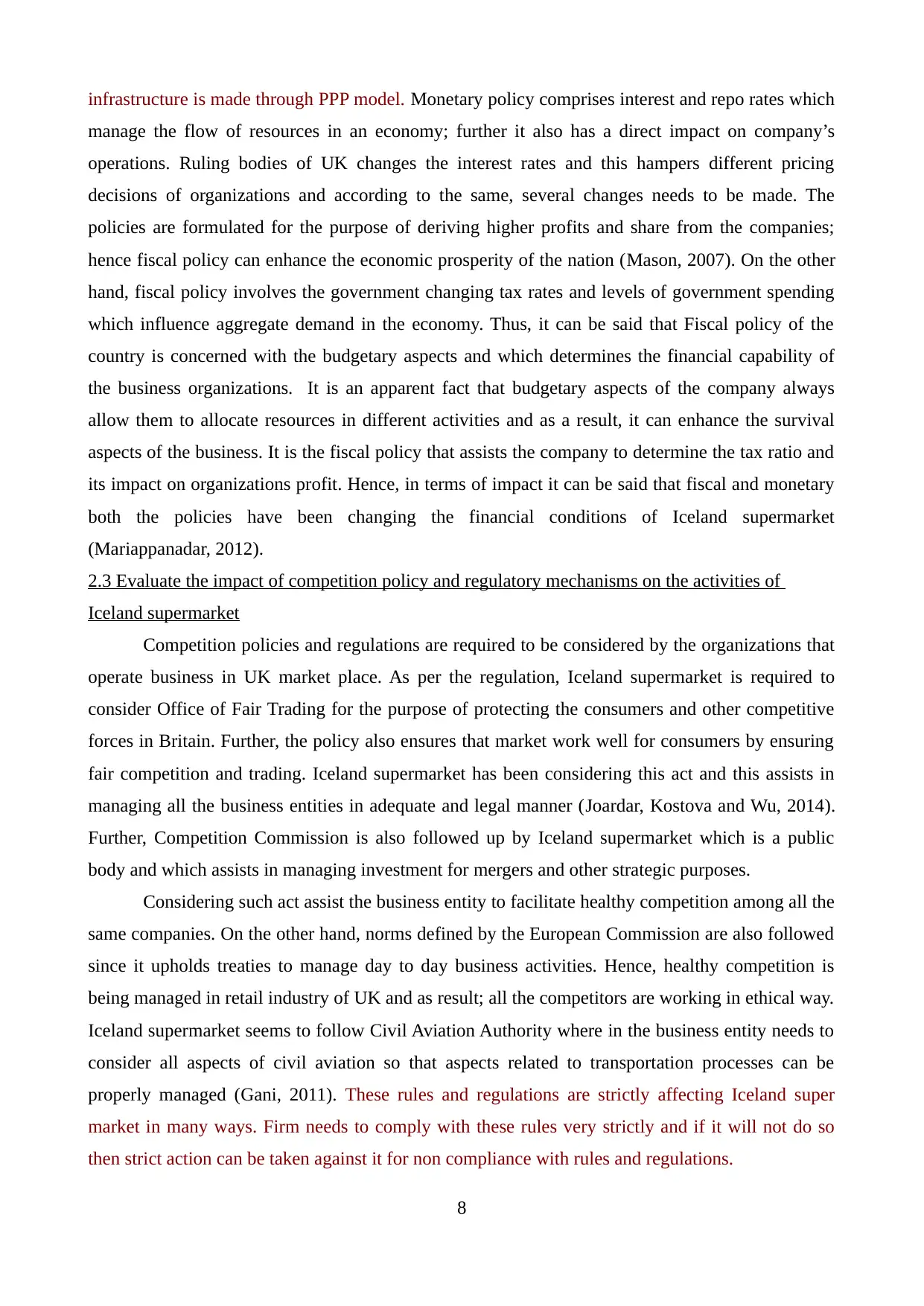
infrastructure is made through PPP model. Monetary policy comprises interest and repo rates which
manage the flow of resources in an economy; further it also has a direct impact on company’s
operations. Ruling bodies of UK changes the interest rates and this hampers different pricing
decisions of organizations and according to the same, several changes needs to be made. The
policies are formulated for the purpose of deriving higher profits and share from the companies;
hence fiscal policy can enhance the economic prosperity of the nation (Mason, 2007). On the other
hand, fiscal policy involves the government changing tax rates and levels of government spending
which influence aggregate demand in the economy. Thus, it can be said that Fiscal policy of the
country is concerned with the budgetary aspects and which determines the financial capability of
the business organizations. It is an apparent fact that budgetary aspects of the company always
allow them to allocate resources in different activities and as a result, it can enhance the survival
aspects of the business. It is the fiscal policy that assists the company to determine the tax ratio and
its impact on organizations profit. Hence, in terms of impact it can be said that fiscal and monetary
both the policies have been changing the financial conditions of Iceland supermarket
(Mariappanadar, 2012).
2.3 Evaluate the impact of competition policy and regulatory mechanisms on the activities of
Iceland supermarket
Competition policies and regulations are required to be considered by the organizations that
operate business in UK market place. As per the regulation, Iceland supermarket is required to
consider Office of Fair Trading for the purpose of protecting the consumers and other competitive
forces in Britain. Further, the policy also ensures that market work well for consumers by ensuring
fair competition and trading. Iceland supermarket has been considering this act and this assists in
managing all the business entities in adequate and legal manner (Joardar, Kostova and Wu, 2014).
Further, Competition Commission is also followed up by Iceland supermarket which is a public
body and which assists in managing investment for mergers and other strategic purposes.
Considering such act assist the business entity to facilitate healthy competition among all the
same companies. On the other hand, norms defined by the European Commission are also followed
since it upholds treaties to manage day to day business activities. Hence, healthy competition is
being managed in retail industry of UK and as result; all the competitors are working in ethical way.
Iceland supermarket seems to follow Civil Aviation Authority where in the business entity needs to
consider all aspects of civil aviation so that aspects related to transportation processes can be
properly managed (Gani, 2011). These rules and regulations are strictly affecting Iceland super
market in many ways. Firm needs to comply with these rules very strictly and if it will not do so
then strict action can be taken against it for non compliance with rules and regulations.
8
manage the flow of resources in an economy; further it also has a direct impact on company’s
operations. Ruling bodies of UK changes the interest rates and this hampers different pricing
decisions of organizations and according to the same, several changes needs to be made. The
policies are formulated for the purpose of deriving higher profits and share from the companies;
hence fiscal policy can enhance the economic prosperity of the nation (Mason, 2007). On the other
hand, fiscal policy involves the government changing tax rates and levels of government spending
which influence aggregate demand in the economy. Thus, it can be said that Fiscal policy of the
country is concerned with the budgetary aspects and which determines the financial capability of
the business organizations. It is an apparent fact that budgetary aspects of the company always
allow them to allocate resources in different activities and as a result, it can enhance the survival
aspects of the business. It is the fiscal policy that assists the company to determine the tax ratio and
its impact on organizations profit. Hence, in terms of impact it can be said that fiscal and monetary
both the policies have been changing the financial conditions of Iceland supermarket
(Mariappanadar, 2012).
2.3 Evaluate the impact of competition policy and regulatory mechanisms on the activities of
Iceland supermarket
Competition policies and regulations are required to be considered by the organizations that
operate business in UK market place. As per the regulation, Iceland supermarket is required to
consider Office of Fair Trading for the purpose of protecting the consumers and other competitive
forces in Britain. Further, the policy also ensures that market work well for consumers by ensuring
fair competition and trading. Iceland supermarket has been considering this act and this assists in
managing all the business entities in adequate and legal manner (Joardar, Kostova and Wu, 2014).
Further, Competition Commission is also followed up by Iceland supermarket which is a public
body and which assists in managing investment for mergers and other strategic purposes.
Considering such act assist the business entity to facilitate healthy competition among all the
same companies. On the other hand, norms defined by the European Commission are also followed
since it upholds treaties to manage day to day business activities. Hence, healthy competition is
being managed in retail industry of UK and as result; all the competitors are working in ethical way.
Iceland supermarket seems to follow Civil Aviation Authority where in the business entity needs to
consider all aspects of civil aviation so that aspects related to transportation processes can be
properly managed (Gani, 2011). These rules and regulations are strictly affecting Iceland super
market in many ways. Firm needs to comply with these rules very strictly and if it will not do so
then strict action can be taken against it for non compliance with rules and regulations.
8
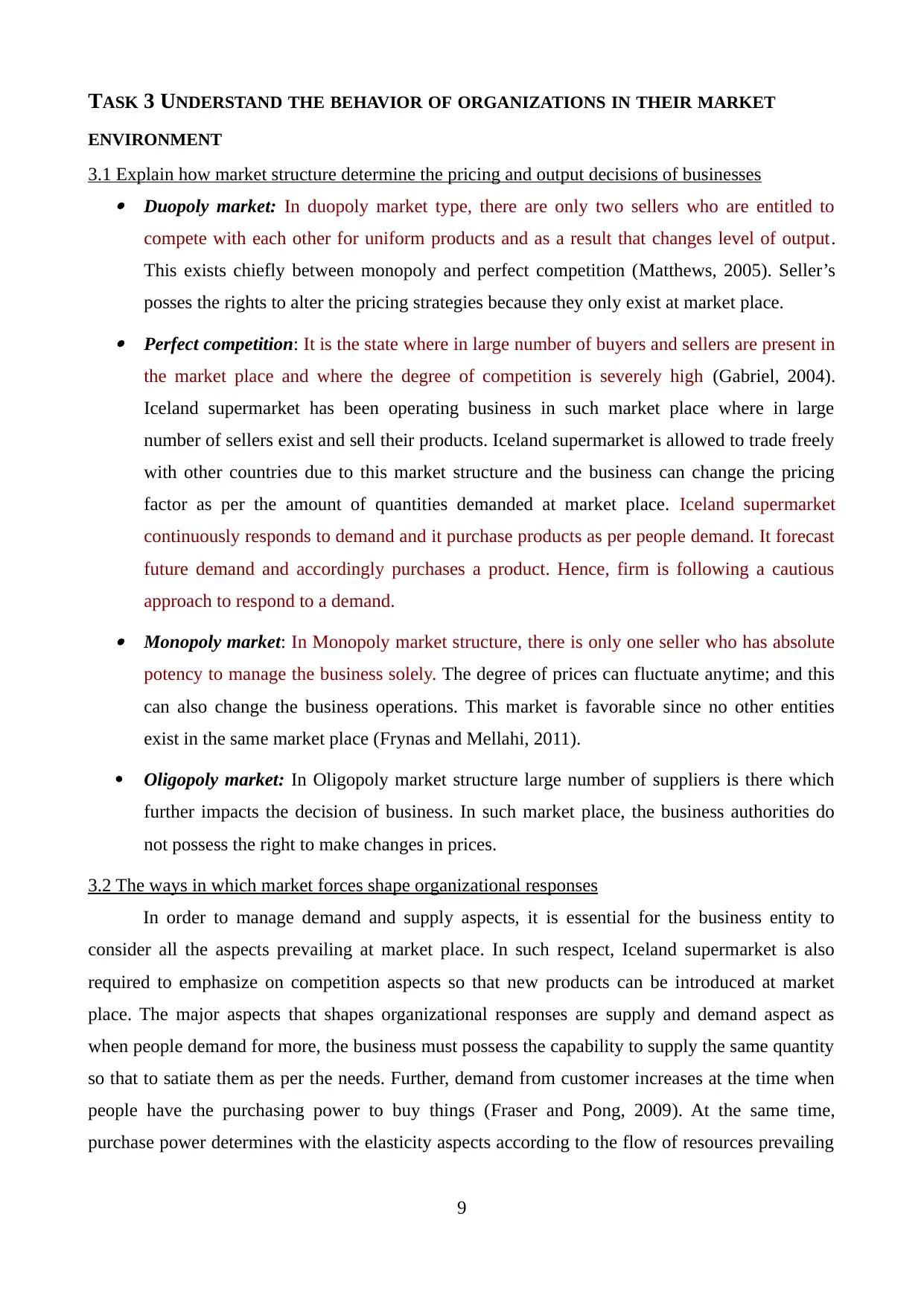
TASK 3 UNDERSTAND THE BEHAVIOR OF ORGANIZATIONS IN THEIR MARKET
ENVIRONMENT
3.1 Explain how market structure determine the pricing and output decisions of businesses Duopoly market: In duopoly market type, there are only two sellers who are entitled to
compete with each other for uniform products and as a result that changes level of output.
This exists chiefly between monopoly and perfect competition (Matthews, 2005). Seller’s
posses the rights to alter the pricing strategies because they only exist at market place.
Perfect competition: It is the state where in large number of buyers and sellers are present in
the market place and where the degree of competition is severely high (Gabriel, 2004).
Iceland supermarket has been operating business in such market place where in large
number of sellers exist and sell their products. Iceland supermarket is allowed to trade freely
with other countries due to this market structure and the business can change the pricing
factor as per the amount of quantities demanded at market place. Iceland supermarket
continuously responds to demand and it purchase products as per people demand. It forecast
future demand and accordingly purchases a product. Hence, firm is following a cautious
approach to respond to a demand.
Monopoly market: In Monopoly market structure, there is only one seller who has absolute
potency to manage the business solely. The degree of prices can fluctuate anytime; and this
can also change the business operations. This market is favorable since no other entities
exist in the same market place (Frynas and Mellahi, 2011).
Oligopoly market: In Oligopoly market structure large number of suppliers is there which
further impacts the decision of business. In such market place, the business authorities do
not possess the right to make changes in prices.
3.2 The ways in which market forces shape organizational responses
In order to manage demand and supply aspects, it is essential for the business entity to
consider all the aspects prevailing at market place. In such respect, Iceland supermarket is also
required to emphasize on competition aspects so that new products can be introduced at market
place. The major aspects that shapes organizational responses are supply and demand aspect as
when people demand for more, the business must possess the capability to supply the same quantity
so that to satiate them as per the needs. Further, demand from customer increases at the time when
people have the purchasing power to buy things (Fraser and Pong, 2009). At the same time,
purchase power determines with the elasticity aspects according to the flow of resources prevailing
9
ENVIRONMENT
3.1 Explain how market structure determine the pricing and output decisions of businesses Duopoly market: In duopoly market type, there are only two sellers who are entitled to
compete with each other for uniform products and as a result that changes level of output.
This exists chiefly between monopoly and perfect competition (Matthews, 2005). Seller’s
posses the rights to alter the pricing strategies because they only exist at market place.
Perfect competition: It is the state where in large number of buyers and sellers are present in
the market place and where the degree of competition is severely high (Gabriel, 2004).
Iceland supermarket has been operating business in such market place where in large
number of sellers exist and sell their products. Iceland supermarket is allowed to trade freely
with other countries due to this market structure and the business can change the pricing
factor as per the amount of quantities demanded at market place. Iceland supermarket
continuously responds to demand and it purchase products as per people demand. It forecast
future demand and accordingly purchases a product. Hence, firm is following a cautious
approach to respond to a demand.
Monopoly market: In Monopoly market structure, there is only one seller who has absolute
potency to manage the business solely. The degree of prices can fluctuate anytime; and this
can also change the business operations. This market is favorable since no other entities
exist in the same market place (Frynas and Mellahi, 2011).
Oligopoly market: In Oligopoly market structure large number of suppliers is there which
further impacts the decision of business. In such market place, the business authorities do
not possess the right to make changes in prices.
3.2 The ways in which market forces shape organizational responses
In order to manage demand and supply aspects, it is essential for the business entity to
consider all the aspects prevailing at market place. In such respect, Iceland supermarket is also
required to emphasize on competition aspects so that new products can be introduced at market
place. The major aspects that shapes organizational responses are supply and demand aspect as
when people demand for more, the business must possess the capability to supply the same quantity
so that to satiate them as per the needs. Further, demand from customer increases at the time when
people have the purchasing power to buy things (Fraser and Pong, 2009). At the same time,
purchase power determines with the elasticity aspects according to the flow of resources prevailing
9
⊘ This is a preview!⊘
Do you want full access?
Subscribe today to unlock all pages.

Trusted by 1+ million students worldwide
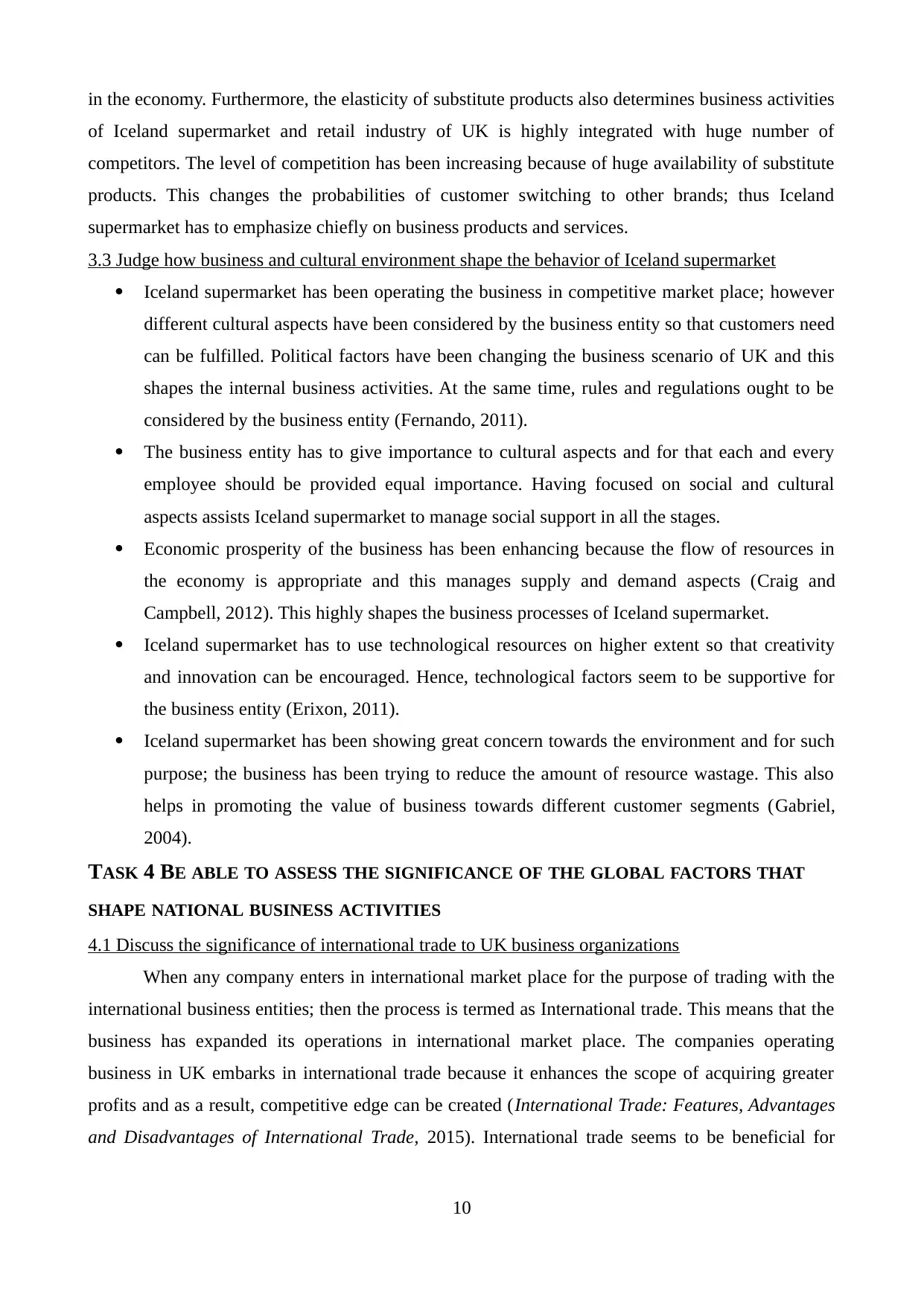
in the economy. Furthermore, the elasticity of substitute products also determines business activities
of Iceland supermarket and retail industry of UK is highly integrated with huge number of
competitors. The level of competition has been increasing because of huge availability of substitute
products. This changes the probabilities of customer switching to other brands; thus Iceland
supermarket has to emphasize chiefly on business products and services.
3.3 Judge how business and cultural environment shape the behavior of Iceland supermarket
Iceland supermarket has been operating the business in competitive market place; however
different cultural aspects have been considered by the business entity so that customers need
can be fulfilled. Political factors have been changing the business scenario of UK and this
shapes the internal business activities. At the same time, rules and regulations ought to be
considered by the business entity (Fernando, 2011).
The business entity has to give importance to cultural aspects and for that each and every
employee should be provided equal importance. Having focused on social and cultural
aspects assists Iceland supermarket to manage social support in all the stages.
Economic prosperity of the business has been enhancing because the flow of resources in
the economy is appropriate and this manages supply and demand aspects (Craig and
Campbell, 2012). This highly shapes the business processes of Iceland supermarket.
Iceland supermarket has to use technological resources on higher extent so that creativity
and innovation can be encouraged. Hence, technological factors seem to be supportive for
the business entity (Erixon, 2011).
Iceland supermarket has been showing great concern towards the environment and for such
purpose; the business has been trying to reduce the amount of resource wastage. This also
helps in promoting the value of business towards different customer segments (Gabriel,
2004).
TASK 4 BE ABLE TO ASSESS THE SIGNIFICANCE OF THE GLOBAL FACTORS THAT
SHAPE NATIONAL BUSINESS ACTIVITIES
4.1 Discuss the significance of international trade to UK business organizations
When any company enters in international market place for the purpose of trading with the
international business entities; then the process is termed as International trade. This means that the
business has expanded its operations in international market place. The companies operating
business in UK embarks in international trade because it enhances the scope of acquiring greater
profits and as a result, competitive edge can be created (International Trade: Features, Advantages
and Disadvantages of International Trade, 2015). International trade seems to be beneficial for
10
of Iceland supermarket and retail industry of UK is highly integrated with huge number of
competitors. The level of competition has been increasing because of huge availability of substitute
products. This changes the probabilities of customer switching to other brands; thus Iceland
supermarket has to emphasize chiefly on business products and services.
3.3 Judge how business and cultural environment shape the behavior of Iceland supermarket
Iceland supermarket has been operating the business in competitive market place; however
different cultural aspects have been considered by the business entity so that customers need
can be fulfilled. Political factors have been changing the business scenario of UK and this
shapes the internal business activities. At the same time, rules and regulations ought to be
considered by the business entity (Fernando, 2011).
The business entity has to give importance to cultural aspects and for that each and every
employee should be provided equal importance. Having focused on social and cultural
aspects assists Iceland supermarket to manage social support in all the stages.
Economic prosperity of the business has been enhancing because the flow of resources in
the economy is appropriate and this manages supply and demand aspects (Craig and
Campbell, 2012). This highly shapes the business processes of Iceland supermarket.
Iceland supermarket has to use technological resources on higher extent so that creativity
and innovation can be encouraged. Hence, technological factors seem to be supportive for
the business entity (Erixon, 2011).
Iceland supermarket has been showing great concern towards the environment and for such
purpose; the business has been trying to reduce the amount of resource wastage. This also
helps in promoting the value of business towards different customer segments (Gabriel,
2004).
TASK 4 BE ABLE TO ASSESS THE SIGNIFICANCE OF THE GLOBAL FACTORS THAT
SHAPE NATIONAL BUSINESS ACTIVITIES
4.1 Discuss the significance of international trade to UK business organizations
When any company enters in international market place for the purpose of trading with the
international business entities; then the process is termed as International trade. This means that the
business has expanded its operations in international market place. The companies operating
business in UK embarks in international trade because it enhances the scope of acquiring greater
profits and as a result, competitive edge can be created (International Trade: Features, Advantages
and Disadvantages of International Trade, 2015). International trade seems to be beneficial for
10
Paraphrase This Document
Need a fresh take? Get an instant paraphrase of this document with our AI Paraphraser
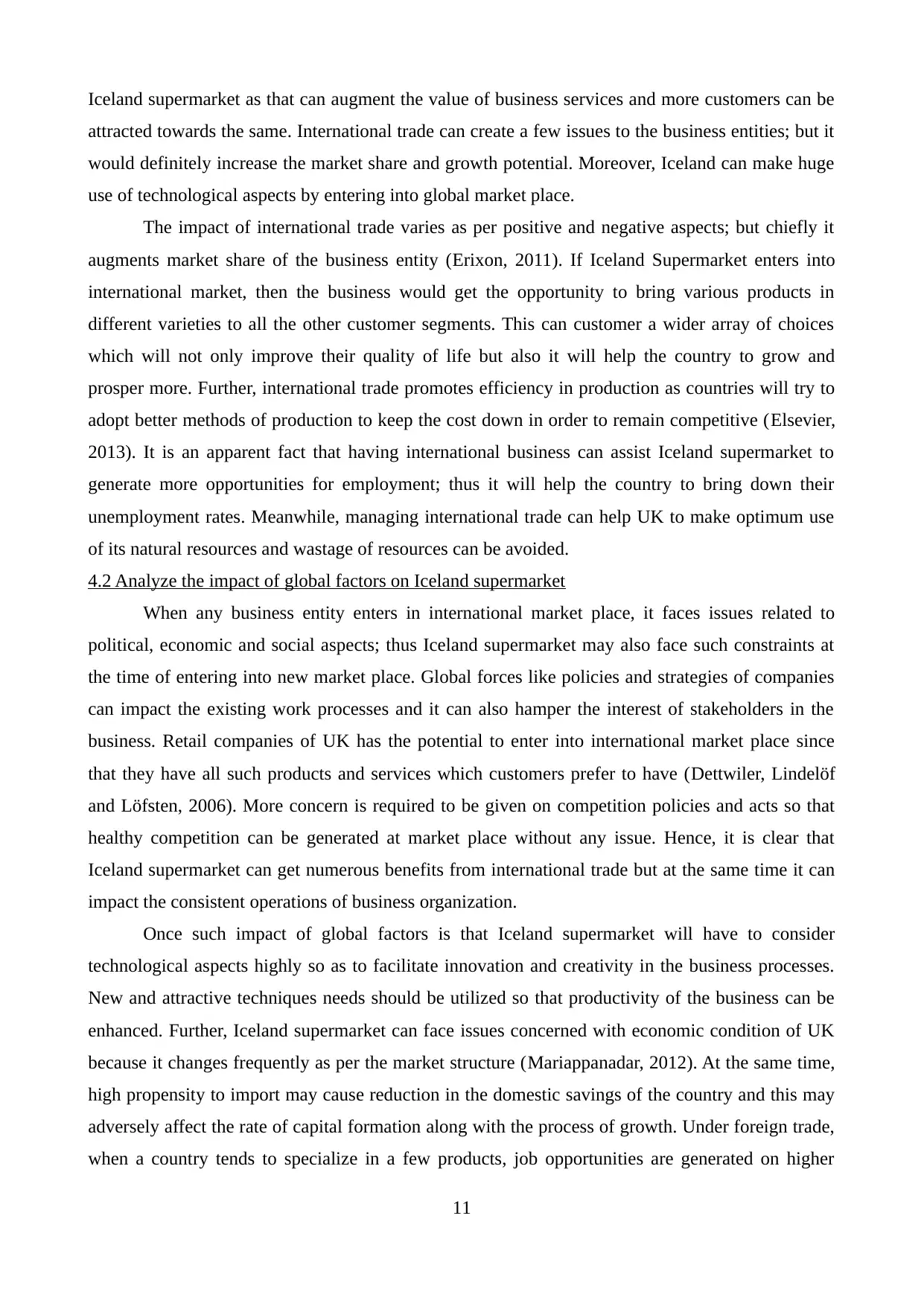
Iceland supermarket as that can augment the value of business services and more customers can be
attracted towards the same. International trade can create a few issues to the business entities; but it
would definitely increase the market share and growth potential. Moreover, Iceland can make huge
use of technological aspects by entering into global market place.
The impact of international trade varies as per positive and negative aspects; but chiefly it
augments market share of the business entity (Erixon, 2011). If Iceland Supermarket enters into
international market, then the business would get the opportunity to bring various products in
different varieties to all the other customer segments. This can customer a wider array of choices
which will not only improve their quality of life but also it will help the country to grow and
prosper more. Further, international trade promotes efficiency in production as countries will try to
adopt better methods of production to keep the cost down in order to remain competitive (Elsevier,
2013). It is an apparent fact that having international business can assist Iceland supermarket to
generate more opportunities for employment; thus it will help the country to bring down their
unemployment rates. Meanwhile, managing international trade can help UK to make optimum use
of its natural resources and wastage of resources can be avoided.
4.2 Analyze the impact of global factors on Iceland supermarket
When any business entity enters in international market place, it faces issues related to
political, economic and social aspects; thus Iceland supermarket may also face such constraints at
the time of entering into new market place. Global forces like policies and strategies of companies
can impact the existing work processes and it can also hamper the interest of stakeholders in the
business. Retail companies of UK has the potential to enter into international market place since
that they have all such products and services which customers prefer to have (Dettwiler, Lindelöf
and Löfsten, 2006). More concern is required to be given on competition policies and acts so that
healthy competition can be generated at market place without any issue. Hence, it is clear that
Iceland supermarket can get numerous benefits from international trade but at the same time it can
impact the consistent operations of business organization.
Once such impact of global factors is that Iceland supermarket will have to consider
technological aspects highly so as to facilitate innovation and creativity in the business processes.
New and attractive techniques needs should be utilized so that productivity of the business can be
enhanced. Further, Iceland supermarket can face issues concerned with economic condition of UK
because it changes frequently as per the market structure (Mariappanadar, 2012). At the same time,
high propensity to import may cause reduction in the domestic savings of the country and this may
adversely affect the rate of capital formation along with the process of growth. Under foreign trade,
when a country tends to specialize in a few products, job opportunities are generated on higher
11
attracted towards the same. International trade can create a few issues to the business entities; but it
would definitely increase the market share and growth potential. Moreover, Iceland can make huge
use of technological aspects by entering into global market place.
The impact of international trade varies as per positive and negative aspects; but chiefly it
augments market share of the business entity (Erixon, 2011). If Iceland Supermarket enters into
international market, then the business would get the opportunity to bring various products in
different varieties to all the other customer segments. This can customer a wider array of choices
which will not only improve their quality of life but also it will help the country to grow and
prosper more. Further, international trade promotes efficiency in production as countries will try to
adopt better methods of production to keep the cost down in order to remain competitive (Elsevier,
2013). It is an apparent fact that having international business can assist Iceland supermarket to
generate more opportunities for employment; thus it will help the country to bring down their
unemployment rates. Meanwhile, managing international trade can help UK to make optimum use
of its natural resources and wastage of resources can be avoided.
4.2 Analyze the impact of global factors on Iceland supermarket
When any business entity enters in international market place, it faces issues related to
political, economic and social aspects; thus Iceland supermarket may also face such constraints at
the time of entering into new market place. Global forces like policies and strategies of companies
can impact the existing work processes and it can also hamper the interest of stakeholders in the
business. Retail companies of UK has the potential to enter into international market place since
that they have all such products and services which customers prefer to have (Dettwiler, Lindelöf
and Löfsten, 2006). More concern is required to be given on competition policies and acts so that
healthy competition can be generated at market place without any issue. Hence, it is clear that
Iceland supermarket can get numerous benefits from international trade but at the same time it can
impact the consistent operations of business organization.
Once such impact of global factors is that Iceland supermarket will have to consider
technological aspects highly so as to facilitate innovation and creativity in the business processes.
New and attractive techniques needs should be utilized so that productivity of the business can be
enhanced. Further, Iceland supermarket can face issues concerned with economic condition of UK
because it changes frequently as per the market structure (Mariappanadar, 2012). At the same time,
high propensity to import may cause reduction in the domestic savings of the country and this may
adversely affect the rate of capital formation along with the process of growth. Under foreign trade,
when a country tends to specialize in a few products, job opportunities are generated on higher
11
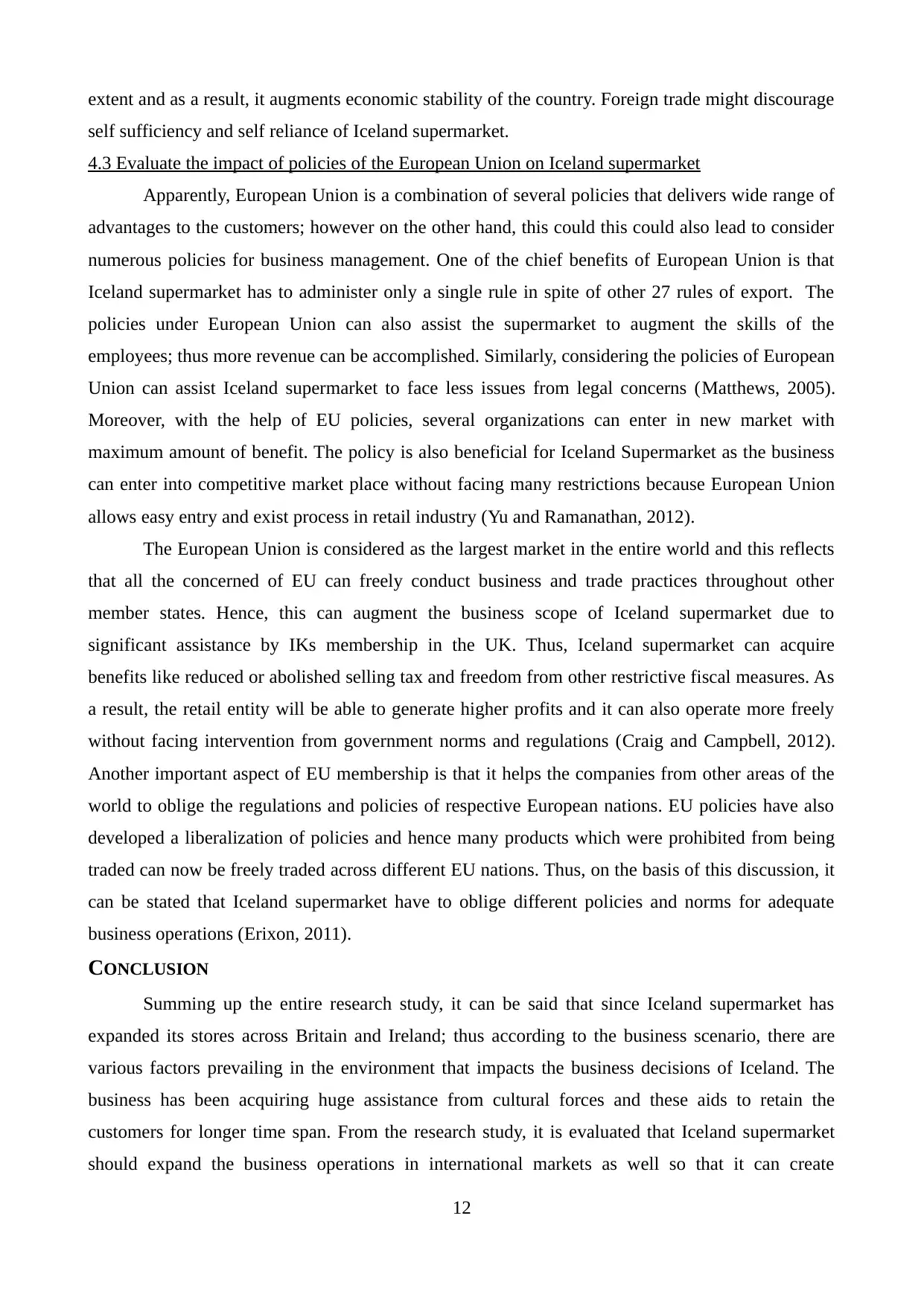
extent and as a result, it augments economic stability of the country. Foreign trade might discourage
self sufficiency and self reliance of Iceland supermarket.
4.3 Evaluate the impact of policies of the European Union on Iceland supermarket
Apparently, European Union is a combination of several policies that delivers wide range of
advantages to the customers; however on the other hand, this could this could also lead to consider
numerous policies for business management. One of the chief benefits of European Union is that
Iceland supermarket has to administer only a single rule in spite of other 27 rules of export. The
policies under European Union can also assist the supermarket to augment the skills of the
employees; thus more revenue can be accomplished. Similarly, considering the policies of European
Union can assist Iceland supermarket to face less issues from legal concerns (Matthews, 2005).
Moreover, with the help of EU policies, several organizations can enter in new market with
maximum amount of benefit. The policy is also beneficial for Iceland Supermarket as the business
can enter into competitive market place without facing many restrictions because European Union
allows easy entry and exist process in retail industry (Yu and Ramanathan, 2012).
The European Union is considered as the largest market in the entire world and this reflects
that all the concerned of EU can freely conduct business and trade practices throughout other
member states. Hence, this can augment the business scope of Iceland supermarket due to
significant assistance by IKs membership in the UK. Thus, Iceland supermarket can acquire
benefits like reduced or abolished selling tax and freedom from other restrictive fiscal measures. As
a result, the retail entity will be able to generate higher profits and it can also operate more freely
without facing intervention from government norms and regulations (Craig and Campbell, 2012).
Another important aspect of EU membership is that it helps the companies from other areas of the
world to oblige the regulations and policies of respective European nations. EU policies have also
developed a liberalization of policies and hence many products which were prohibited from being
traded can now be freely traded across different EU nations. Thus, on the basis of this discussion, it
can be stated that Iceland supermarket have to oblige different policies and norms for adequate
business operations (Erixon, 2011).
CONCLUSION
Summing up the entire research study, it can be said that since Iceland supermarket has
expanded its stores across Britain and Ireland; thus according to the business scenario, there are
various factors prevailing in the environment that impacts the business decisions of Iceland. The
business has been acquiring huge assistance from cultural forces and these aids to retain the
customers for longer time span. From the research study, it is evaluated that Iceland supermarket
should expand the business operations in international markets as well so that it can create
12
self sufficiency and self reliance of Iceland supermarket.
4.3 Evaluate the impact of policies of the European Union on Iceland supermarket
Apparently, European Union is a combination of several policies that delivers wide range of
advantages to the customers; however on the other hand, this could this could also lead to consider
numerous policies for business management. One of the chief benefits of European Union is that
Iceland supermarket has to administer only a single rule in spite of other 27 rules of export. The
policies under European Union can also assist the supermarket to augment the skills of the
employees; thus more revenue can be accomplished. Similarly, considering the policies of European
Union can assist Iceland supermarket to face less issues from legal concerns (Matthews, 2005).
Moreover, with the help of EU policies, several organizations can enter in new market with
maximum amount of benefit. The policy is also beneficial for Iceland Supermarket as the business
can enter into competitive market place without facing many restrictions because European Union
allows easy entry and exist process in retail industry (Yu and Ramanathan, 2012).
The European Union is considered as the largest market in the entire world and this reflects
that all the concerned of EU can freely conduct business and trade practices throughout other
member states. Hence, this can augment the business scope of Iceland supermarket due to
significant assistance by IKs membership in the UK. Thus, Iceland supermarket can acquire
benefits like reduced or abolished selling tax and freedom from other restrictive fiscal measures. As
a result, the retail entity will be able to generate higher profits and it can also operate more freely
without facing intervention from government norms and regulations (Craig and Campbell, 2012).
Another important aspect of EU membership is that it helps the companies from other areas of the
world to oblige the regulations and policies of respective European nations. EU policies have also
developed a liberalization of policies and hence many products which were prohibited from being
traded can now be freely traded across different EU nations. Thus, on the basis of this discussion, it
can be stated that Iceland supermarket have to oblige different policies and norms for adequate
business operations (Erixon, 2011).
CONCLUSION
Summing up the entire research study, it can be said that since Iceland supermarket has
expanded its stores across Britain and Ireland; thus according to the business scenario, there are
various factors prevailing in the environment that impacts the business decisions of Iceland. The
business has been acquiring huge assistance from cultural forces and these aids to retain the
customers for longer time span. From the research study, it is evaluated that Iceland supermarket
should expand the business operations in international markets as well so that it can create
12
⊘ This is a preview!⊘
Do you want full access?
Subscribe today to unlock all pages.

Trusted by 1+ million students worldwide
1 out of 14
Related Documents
Your All-in-One AI-Powered Toolkit for Academic Success.
+13062052269
info@desklib.com
Available 24*7 on WhatsApp / Email
![[object Object]](/_next/static/media/star-bottom.7253800d.svg)
Unlock your academic potential
Copyright © 2020–2026 A2Z Services. All Rights Reserved. Developed and managed by ZUCOL.





